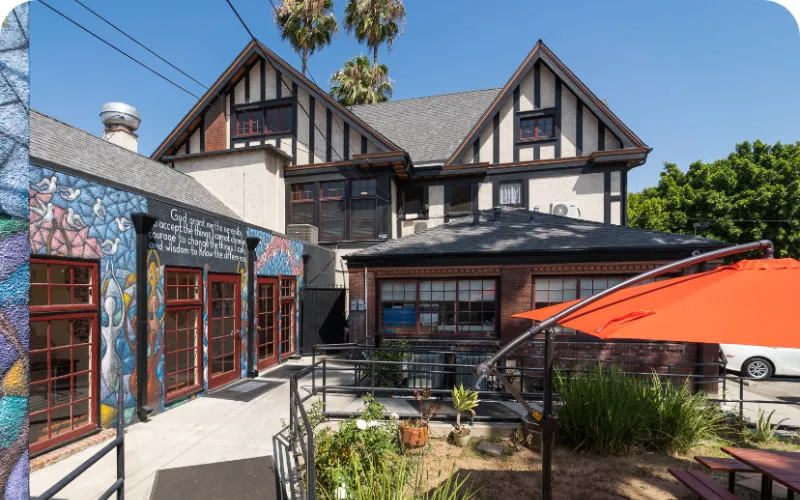Programs for pregnant women provide specialized care to address mental health, addiction, and emotional well-being during pregnancy. Therapy focuses on fostering healthy coping strategies, ensuring prenatal health, and preparing for motherhood. Supportive environments empower women to prioritize both their own and their baby’s well-being.
Ads
More Info
Advertisement Disclosure
Our website is funded by advertisers who pay for prominently labeled placements.
Read More23 Rehab Centers were found
Filters
Locations
- Los Angeles(+98)
- Culver City(+14)
- Westlake Village(+13)
- Woodland Hills(+11)
- Beverly Hills(+10)
- Santa Monica(+9)
- Sherman Oaks(+7)
- West Hollywood(+6)
- Malibu(+5)
- Chatsworth(+5)
- Pasadena(+5)
- Encino(+5)
- Redondo Beach(+4)
- Lancaster(+4)
- Reseda(+4)
- Studio City(+4)
- Northridge(+3)
- San Mateo(+3)
- Lynwood(+3)
- Vernon(+3)
- Van Nuys(+3)
- Tarzana(+3)
- North Hollywood(+3)
- Glendale(+3)
- Gardena(+3)
- Riverside(+3)
- Granada Hills(+2)
- Shadow Hills(+2)
- Venice(+2)
- Orange County(+2)
- Pomona(+2)
- West Hills(+2)
- Valley Village(+2)
- Burbank(+2)
- Brentwood(+2)
- Long Beach(+2)
- Sun Valley(+1)
- Torrance(+1)
- San Jacinto(+1)
- San Pedro(+1)
- Upland(+1)
- Whittier(+1)
- Toluca Lake(+1)
- Thousand Oaks(+1)
- Simi Valley(+1)
- Mission Viejo(+1)
- Acton(+1)
- Beaumont(+1)
- Wilmington(+1)
- Panorama City(+1)
- Anaheim(+1)
- Laguna Hills(+1)
- Inglewood(+1)
- Alhambra(+1)
- Rosemead(+1)
- Maywood(+1)
- Manhattan Beach(+1)
- Monterey Park(+1)
- Claremont(+1)
- Covina(+1)
- La Puente(+1)
- Pico Rivera(+1)
- San Fernando(+1)
- Azusa(+1)
- Santa Fe Springs(+1)
- Glendora(+1)
- Agoura Hills(+1)
- El Segundo(+1)
- Duarte(+0)
- Sunland(+0)
- Downey(+0)
- Cudahy(+0)
- El Monte(+0)
- Compton(+0)
- Hermosa Beach(+0)
- Cerritos(+0)
- Calabasas(+0)
- Bellflower(+0)
- Bell Gardens(+0)
- Avalon(+0)
- Arcadia(+0)
- Altadena(+0)
- Paramount(+0)
- South El Monte(+0)
- Walnut(+0)
- West Covina(+0)
- Santa Clarita(+0)
- San Gabriel(+0)
- San Dimas(+0)
- Rolling Hills(+0)
- Orange(+0)
- Hawaiian Gardens(+0)
- Palmdale(+0)
- Norwalk(+0)
- Montebello(+0)
- Lakewood(+0)
- South Pasadena(+0)
- Carson(+0)
- Hawthorne(+0)
Conditions
- Drug(+278)
- Alcohol(+219)
- Mental Health(+195)
- Opioid(+193)
- Cocaine(+184)
- Trauma(+180)
- Methamphetamine(+177)
- Benzodiazepines(+174)
- Heroin(+173)
- Prescription Drugs(+159)
- Depression(+152)
- Anxiety(+149)
- Xanax(+145)
- Synthetic Drugs(+138)
- PTSD(+133)
- Adderall(+131)
- Marijuana(+112)
- Bipolar(+109)
- Ecstasy(+104)
- MDMA(+99)
- Behavioral Health(+93)
- LSD(+93)
- Psychedelics(+91)
- Fentanyl(+71)
- Stress(+71)
- OCD(+69)
- Personality Disorders(+63)
- ADHD(+61)
- Gambling(+38)
- Eating Disorders(+35)
- Anorexia(+34)
- Binge Eating Disorder(+34)
- Bulimia(+33)
- Schizophrenia(+32)
- Gaming(+28)
- Internet Addiction(+27)
- Sex Addiction(+25)
- Burnout(+23)
- Pornography(+22)
- Shopping(+10)
- Narcissism(+8)
Insurances
- BlueCross BlueShield(+129)
- Aetna(+126)
- Anthem(+105)
- Cigna(+105)
- United Healthcare(+66)
- Humana(+63)
- Optum(+53)
- Medicaid(+53)
- MHN(+51)
- Magellan Health(+47)
- Kaiser Permanente(+39)
- Medicare(+31)
- GEHA(+31)
- ComPsych(+29)
- Highmark(+25)
- AmeriHealth(+13)
- Tufts Health(+11)
- Oscar(+9)
- CareFirst(+9)
- Molina Healthcare(+8)
- Intermountain Healthcare(+6)
- Beacon Health Options(+2)
- UMR(+2)
- NYSHIP(+2)
- ILWU(+2)
- Geisinger(+2)
- Empire Life(+2)
- Empire BCBS(+2)
- Bright Health(+2)
- GuideWell(+1)
Therapies

$45,000+ - 30-90 days

$1,750-$3,500

$7,000

N/A

N/A

$2,000 - $3000/day
Rehab Programs for Pregnant Women: Compassionate Care for Maternal and Fetal Health
Rehab programs for pregnant women provide specialized support to address substance use disorders while prioritizing the safety and well-being of both mother and baby. By integrating medical expertise, prenatal care, and trauma-informed therapies, these programs foster healthier pregnancies, reduce risks to fetal development, and empower mothers-to-be with tools for lasting recovery. Below, we explore the critical components, benefits, and pathways to care for pregnant women seeking treatment.
Why Specialized Care Matters During Pregnancy
Substance use during pregnancy poses unique risks, including preterm birth, low birth weight, and neonatal abstinence syndrome (NAS). Pregnant women often face heightened stigma or fear of legal repercussions, which can delay help-seeking. Specialized programs create nonjudgmental environments where mothers receive:
- Medical supervision to safely manage withdrawal and minimize fetal harm.
- Integrated prenatal care, including OB/GYN services and fetal monitoring.
- Mental health support for pregnancy-related anxiety, depression, or trauma.
Research shows structured prenatal rehab improves birth outcomes and maternal mental health, with participants 50% more likely to maintain sobriety postpartum compared to standard care.
Core Components of Effective Prenatal Rehab
Medical and Prenatal Care Integration
Programs collaborate with obstetricians to monitor fetal health and adjust treatment plans. Medication-assisted treatment (MAT) is carefully tailored to balance maternal recovery and fetal safety, avoiding medications like valproate or high-dose opioids linked to birth defects.
Trauma-Informed Therapies
Many pregnant women have histories of trauma or domestic violence. Therapies such as cognitive-behavioral therapy (CBT) and trauma-focused counseling address underlying triggers while teaching stress management techniques for pregnancy.
Nutritional and Wellness Support
Dietitians provide meal plans to address deficiencies common in substance use disorders, ensuring proper fetal development. Prenatal yoga and mindfulness practices reduce stress and improve emotional regulation.
Parenting and Postpartum Preparation
Classes on neonatal care, breastfeeding, and relapse prevention equip mothers with skills to navigate early parenthood. Postpartum planning includes connections to pediatric care and sober-living resources.
Benefits of Prenatal-Focused Treatment
Healthier Pregnancy Outcomes
Structured detox and prenatal care reduce risks of complications like placental abruption or preterm labor. Fetal monitoring ensures early intervention for developmental concerns.
Reduced Neonatal Risks
MAT protocols like buprenorphine maintenance lower the likelihood of NAS severity by 30%, while abstinence from alcohol prevents fetal alcohol spectrum disorders (FASDs).
Maternal Mental Health Support
Integrated counseling addresses perinatal depression and anxiety, which affect 1 in 5 pregnant women with substance use disorders.
Long-Term Family Stability
Programs emphasizing parenting skills and family therapy improve mother-child bonding and reduce postpartum relapse rates by 40%.
Choosing the Right Program
Accreditation and Medical Expertise
Prioritize facilities staffed by obstetricians, addiction specialists, and mental health clinicians. Verify certifications from organizations like CARF or The Joint Commission.
Customized Care Plans
- Inpatient Programs: Offer 24/7 medical supervision for high-risk pregnancies or severe addiction.
- Outpatient Options (IOP): Allow flexibility for prenatal appointments and family responsibilities.
Postpartum and Aftercare
Strong programs provide postpartum check-ups, pediatric referrals, and sober-living partnerships to support mothers beyond delivery.
Breaking the Stigma
Seeking help during pregnancy is an act of courage and love. Prenatal rehab reframes recovery as a proactive choice to protect both maternal and fetal health, emphasizing that every step toward sobriety benefits two lives.
If you or a loved one is pregnant and struggling with substance use, explore our directory of accredited prenatal rehab programs. Filter by medical expertise, therapy options, and insurance coverage to find a program aligned with your needs.
Recovery supports both you and your baby. Begin your journey today.
Frequently Asked Questions
Is medication-assisted treatment (MAT) safe during pregnancy?
Can I keep my baby with me during rehab?
Do you provide parenting classes?
What if I don’t have insurance?
Ads
More Info
Advertisement Disclosure
Our website is funded by advertisers who pay for prominently labeled placements.
Read More





































